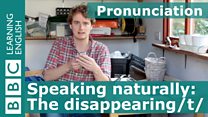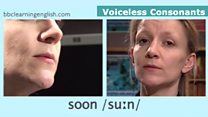Unit 3: Towards advanced
Grammar, news, vocabulary and pronunciation
Select a unit
- 1 Towards advanced
- 2 Towards advanced
- 3 Towards advanced
- 4 Towards advanced
- 5 Towards advanced
- 6 Towards advanced
- 7 Towards advanced
- 8 Towards advanced
- 9 Towards Advanced
- 10 Towards Advanced
- 11 Towards Advanced
- 12 Towards Advanced
- 13 Towards Advanced
- 14 Towards Advanced
- 15 Towards Advanced
- 16 Towards Advanced
- 17 Towards Advanced
- 18 Towards Advanced
- 19 Towards Advanced
- 20 Towards Advanced
- 21 Towards Advanced
- 22 Towards Advanced
- 23 Towards Advanced
- 24 Towards Advanced
- 25 Towards Advanced
- 26 Towards Advanced
- 27 Towards Advanced
- 28 Towards Advanced
- 29 Towards Advanced
- 30 Towards Advanced
Session 5
Tim's Pronunciation Workshop: Gemination /s/
What happens when one word ends in an /s/ sound and the next word begins with an /s/ sound?
Activity 1
Tim's Pronunciation Workshop: 'Twinning' or Gemination
Do you know my star sign?
Tim's back in his pronunciation workshop - and he's not alone. Watch the video to find out who's helping him to explore the wonderful world of gemination - also known as 'twinning'.
Watch the video and complete the activity

Tim
Hi, I'm Tim and this is my pronunciation workshop. Here I'm gonna show you how English is really spoken. It'll help you become a better listener and a more fluent speaker. Come on, let's go inside.
Now, do you know my star sign? Of course you don't, I don't even know my star sign. I don't believe in any of that rubbish. But I know someone who does. Say hello to my twin, Tom.
Tom
Hi.
Tim
Hi Tom.
Tom
Oh, hi Tim.
Tim
So, Tom, what's our star sign?
Tom
I don't know what yours is Tim, but I'm a Gemini.
Tim
Thanks Tom, you can go now.
Tom
You're welcome. Bye.
Tim
You know when I think of Tom, and the fact that I got the brains and the good looks, it makes me feel a bit like this.
Oh, I've got an idea. I can use this to help with this week's topic. Let's ask the people of London what they think of this photo.
Voxpops
That man looks sad.
He looks sad.
He looks sad.
He looks sad.
He looks sad.
He looks sad.
Tim
How many 's' s are there in the words 'he looks sad'. Two, right. But how many can you hear? Watch again.
Voxpops
That man looks sad.
He looks sad.
He looks sad.
He looks sad.
He looks sad.
He looks sad.
Tim
When one word ends in a /s/ sound and the next word begins in /s/, we don't pronounce both sounds, nor do we pronounce just one sound. Instead they come together to make a slightly longer 's' sound. So, 'he looks sad' becomes 'he lookssad'. This is called 'twinning' or gemination. It helps the words to flow smoothly from one to the other in everyday speech. Here are some more examples:
Voxpops
She's silly.
He's sitting over there.
Can you come this Saturday?
That's so unfair!
Tim
Right, so you've heard some examples, now it's your turn. Are you ready to start? Listen and repeat.
Examples
She's silly.
He's sitting over there.
Can you come this Saturday?
That's so unfair!
Tim
So how did you get on? Great. Remember, you can always read more about this topic on our website, bbclearningenglish.com. That's all from the workshop for now. See you next week. Bye bye.
Tom
Oh, Tim, I've got it! If I'm Gemini and you're my twin, then you must be Virgo!
Tim
He really is stupid.
'Twinning' or gemination
When one word ends in a /s/ sound and the next word begins with a /s/ sound, they come together to make a slightly longer /s/ sound. So, he looks sad becomes he lookssad. Native speakers of English often use gemination when they say phrases like these:
She's silly.
He's sitting over there.
Can you come this Saturday?
That's so unfair!
To do
Have a go at this audio quiz to see if you can spot the examples of gemination.
The gemination game
6 Questions
How many examples of 'twinning' (gemination) are there in each sentence? You decide...
Help
Activity
How many examples of 'twinning' (gemination) are there in each sentence? You decide...
Hint
When a word ends with an /s/ sound and the next word starts with an /s/ sound, 'twinning' or gemination means we only hear one slightly longer /s/ sound, not two individual ones.Question 1 of 6

Help
Activity
How many examples of 'twinning' (gemination) are there in each sentence? You decide...
Hint
When a word ends with an /s/ sound and the next word starts with an /s/ sound, 'twinning' or gemination means we only hear one slightly longer /s/ sound, not two individual ones.Question 2 of 6

Help
Activity
How many examples of 'twinning' (gemination) are there in each sentence? You decide...
Hint
When a word ends with an /s/ sound and the next word starts with an /s/ sound, 'twinning' or gemination means we only hear one slightly longer /s/ sound, not two individual ones.Question 3 of 6

Help
Activity
How many examples of 'twinning' (gemination) are there in each sentence? You decide...
Hint
When a word ends with an /s/ sound and the next word starts with an /s/ sound, 'twinning' or gemination means we only hear one slightly longer /s/ sound, not two individual ones.Question 4 of 6

Help
Activity
How many examples of 'twinning' (gemination) are there in each sentence? You decide...
Hint
When a word ends with an /s/ sound and the next word starts with an /s/ sound, 'twinning' or gemination means we only hear one slightly longer /s/ sound, not two individual ones.Question 5 of 6

Help
Activity
How many examples of 'twinning' (gemination) are there in each sentence? You decide...
Hint
When a word ends with an /s/ sound and the next word starts with an /s/ sound, 'twinning' or gemination means we only hear one slightly longer /s/ sound, not two individual ones.Question 6 of 6

Excellent! Great job! Bad luck! You scored:
More
End of Unit 3
That's all for this Unit. In Unit 4, Dan gives us tips on how to use linking words like 'however' and 'although' and Mariam tells the story of Red Riding Hood, which contains 8 uses of the word 'cut. We'll bring you up to date with the latest news in News Review and LingoHack, plus Tim will be working with a disappearing sound in his pronunciation workshop. See you there!
Session Vocabulary
'Twinning' or gemination
When one word ends in a /s/ sound and the next word begins with a /s/ sound, they come together to make a slightly longer /s/ sound. So, he looks sad becomes he lookssad. Native speakers of English often use gemination when they say phrases like these:
- She's silly.
- He's sitting over there.
- Can you come this Saturday?
- That's so unfair!


